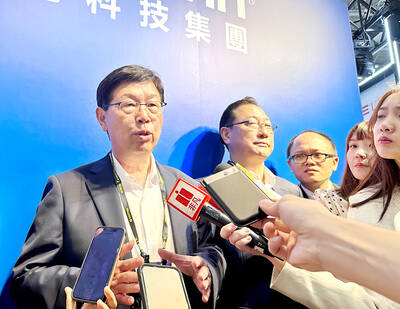The nation’s top three telecom operators, which paid a combined NT$122.07 billion (US$4.02 billion) for access to the 5G spectrum in auctions that ended last week, are racing to launch 5G services by the third quarter.
Chunghwa Telecom Co (中華電信) on Tuesday paid NT$58.37 billion for the 5G spectrum it won during the auctions.
The nation’s biggest telecom company secured 90 megahertz (MHz) of the 3.5 gigahertz (GHz) frequency band, the optimal bandwidth for 5G services, as well as 600MHz in the 28GHz frequency band.
The companies are required to pay for the 5G spectrum they won within one month of the final round of auctions on Saturday last week.
Chunghwa Telecom also submitted its 5G business plan and related documents to the National Communications Commission (NCC) for review, with aiming to roll out its 5G services in July.
Once approved, Chunghwa Telecom can submit its 5G network deployment plan, which details its 5G equipment suppliers and base station locations.
The company said that it has ordered NT$7.39 billion of 5G equipment from Nokia Solutions & Networks Oy and Ericsson AB.
Far EasTone Telecommunications Co Ltd (遠傳電信) on Wednesday paid NT$43.04 billion for its auction bids and submitted its 5G plan to the NCC, it said.
The company plans to order 5G equipment by the end of the month, as it targets the third quarter to roll out 5G services.
Taiwan Mobile Co (台灣大哥大) on Thursday paid NT$30.66 billion to the NCC for its 60MHz bandwidth on the 3.5GHz frequency band, it said in a statement.
After receiving NCC approval, it plans to install 5G base stations to offer better coverage, ultra-high-speed Internet connections and low-latency broadband services, it said.
Separately, Taiwan Mobile on Thursday said it acquired the exclusive rights to distribute online games developed by US-based League of Legends developer Riot Games in Taiwan, Hong Kong and Macau.
Taiwan Mobile would distribute Riot Games’ digital card game Legends of Runeterra on PCs and mobile phones at the end of April.

Taiwan Transport and Storage Corp (TTS, 台灣通運倉儲) yesterday unveiled its first electric tractor unit — manufactured by Volvo Trucks — in a ceremony in Taipei, and said the unit would soon be used to transport cement produced by Taiwan Cement Corp (TCC, 台灣水泥). Both TTS and TCC belong to TCC International Holdings Ltd (台泥國際集團). With the electric tractor unit, the Taipei-based cement firm would become the first in Taiwan to use electric vehicles to transport construction materials. TTS chairman Koo Kung-yi (辜公怡), Volvo Trucks vice president of sales and marketing Johan Selven, TCC president Roman Cheng (程耀輝) and Taikoo Motors Group

Among the rows of vibrators, rubber torsos and leather harnesses at a Chinese sex toys exhibition in Shanghai this weekend, the beginnings of an artificial intelligence (AI)-driven shift in the industry quietly pulsed. China manufactures about 70 percent of the world’s sex toys, most of it the “hardware” on display at the fair — whether that be technicolor tentacled dildos or hyper-realistic personalized silicone dolls. Yet smart toys have been rising in popularity for some time. Many major European and US brands already offer tech-enhanced products that can enable long-distance love, monitor well-being and even bring people one step closer to

RECORD-BREAKING: TSMC’s net profit last quarter beat market expectations by expanding 8.9% and it was the best first-quarter profit in the chipmaker’s history Taiwan Semiconductor Manufacturing Co (TSMC, 台積電), which counts Nvidia Corp as a key customer, yesterday said that artificial intelligence (AI) server chip revenue is set to more than double this year from last year amid rising demand. The chipmaker expects the growth momentum to continue in the next five years with an annual compound growth rate of 50 percent, TSMC chief executive officer C.C. Wei (魏哲家) told investors yesterday. By 2028, AI chips’ contribution to revenue would climb to about 20 percent from a percentage in the low teens, Wei said. “Almost all the AI innovators are working with TSMC to address the

FUTURE PLANS: Although the electric vehicle market is getting more competitive, Hon Hai would stick to its goal of seizing a 5 percent share globally, Young Liu said Hon Hai Precision Industry Co (鴻海精密), a major iPhone assembler and supplier of artificial intelligence (AI) servers powered by Nvidia Corp’s chips, yesterday said it has introduced a rotating chief executive structure as part of the company’s efforts to cultivate future leaders and to enhance corporate governance. The 50-year-old contract electronics maker reported sizable revenue of NT$6.16 trillion (US$189.67 billion) last year. Hon Hai, also known as Foxconn Technology Group (富士康科技集團), has been under the control of one man almost since its inception. A rotating CEO system is a rarity among Taiwanese businesses. Hon Hai has given leaders of the company’s six